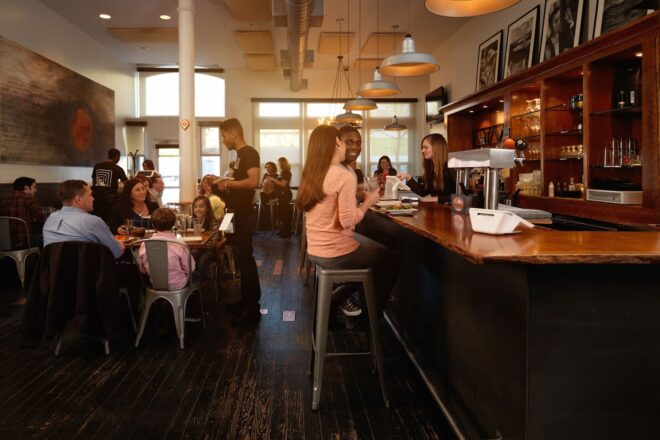How to build a restaurant leadership team
Editorial Team
5 min read
Many small business owners may wish to be present for every transaction and decision made at their shop. That ultra-high level of involvement might make sense for cottage bakeries and small-scale jewelry brands. But restaurant owners—especially those whose businesses are open more than five days per week—must figure out how to scale up their operations while saving time for their personal lives.
Most great restaurants need great restaurant managers. These employees are generally entrusted to mitigate customer complaints, create shift schedules, handle cash drawers and bank deposits, help employees navigate interpersonal conflicts, and even hire employees on behalf of ownership. The question is, how do you find a good one?
Hiring a restaurant leadership team can be overwhelming, but great people are out there to steward your business and satisfy your customers. Here are a few steps and strategies to find—and retain—managers you trust.
Decide what restaurant leadership roles you need
Do you need a refreshed bar program? Weekend shift supervision? Someone who can help with restaurant marketing? Inventory where and how you could use assistance, and use that list to create the position description for your next manager. Be realistic—don’t try to hire a bar manager who also needs to run the restaurant’s social media accounts and work the floor four days a week. But you can use your list to prioritize your hires and measure your future progress.
Several common front-of-house restaurant leadership roles include general manager, assistant general manager, bar manager, events manager, and shift lead. These individuals have various levels of responsibility for hiring staff, creating front-of-house schedules, and handling money. In the back of house, you may need a kitchen manager, a sous chef, or, for larger kitchens, an executive (or head) chef. These individuals generally create back-of-house schedules, order ingredients, plan new menu items, and train junior staff.
Once you know what kind of help you need, it’s time to get the word out. The best way to hire restaurant team members can be through word of mouth, but you can also post openings via job boards–Indeed, HCareers, and Culinary Agents, to name a few–and social media.
Seek candidates with great communication skills
Restaurant leadership sets the tone for workers and customers. If a chef bullies their cooks, they’ll create an environment of shame and insecurity, and that mood will find its way into the dining room. But if the chef corrects a cook’s mistakes with firm yet compassionate guidance, they can build loyalty and help create a more enjoyable workplace.
Great restaurant managers are great communicators. They’re clear about their expectations, patient when things go wrong, and reasonably upbeat toward customers and workers. When stressful moments arrive, they stay calm and address the root issue instead of letting emotions take over. Look for a candidate with a strong sense of professionalism and self-awareness.
READ: How to manage restaurant staff effectively
Make smart internal hires
As you build trust with your employees, find out who might be well suited to a management position. Who charms every customer? Who designs Excel spreadsheets like a pro? When a management opportunity arises, let your staff know, then consider and interview each internal applicant.
If you promote one of your hourly workers, make sure you check in with them as their relationship with their co-workers transitions from peer to authority figure. Restaurant employees often form close bonds, which can enhance customer service and increase worker retention—but can also complicate internal promotions. If they need advice about socializing with other employees outside of work, talk it through with them. Also, consider offering them the opportunity to take restaurant leadership training.
Respect your managers’ boundaries
The biggest downside of being a restaurant manager is the job’s insatiable appetite for free time. Mitigate burnout and increase retention by encouraging managers to set boundaries on their availability–or reward managers if they choose to work that sixth or seventh consecutive day to alleviate a crisis. And remember, not only must your restaurant’s benefits package include paid time off—you must empower your employees to use it.
Of course, it can be tempting to micromanage your new managers. Remember, though, you hired them because they were qualified, right? To retain your restaurant team, avoid the urge to chime in on every decision made at your business. If a manager is not doing a sufficient job, you may have to let them know how they should change their behavior. Otherwise, practice effective delegation, knowing you have competent people on your team–you’ll probably sleep a little easier at night, too.
Let Clover shoulder restaurant management tasks
The Clover App Market is full of helpful employee management apps for your POS system. Gusto, for instance, is a full-service payroll system that can automatically file your payroll taxes. Time Clock by Homebase is an employee scheduling app that syncs with Gusto. Learn how you can help reduce your workload by exploring the App Market today. And, if you need a hand with your Clover POS system or simply have questions about an app, be sure to reach out to a Clover Consultant.
Related Posts
WILD Park Slope
Full Service Restaurants (FSR)
11 types of restaurant categories & dining experiences
Popular Topics
Stay In Touch
Sign up and learn more about Clover.
Thank you for your subscription!
Recent Stories
- Jewelry store supplies and equipment needed for opening day
- How small businesses can use employee discounts to retain staff
- Tips and tricks for opening an outdoor pop-up restaurant
Please share your contact information
to access our premium content.
Thank you for sharing your contact information.
Download Now





